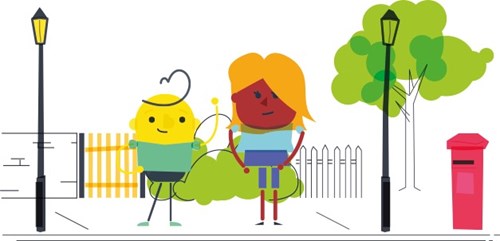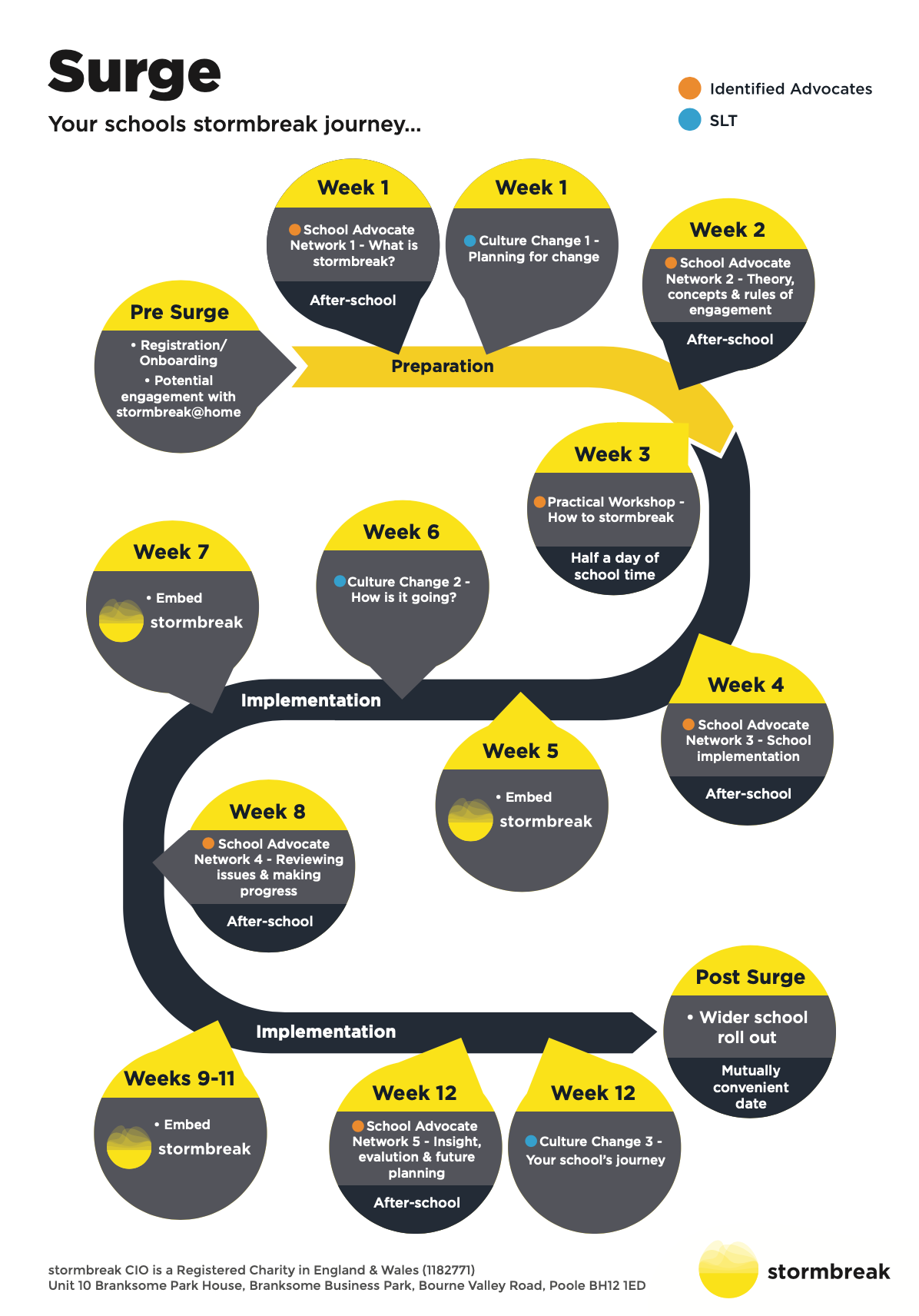School Leadership Focus: how stormbreak supports RSE and Health Education curriculum.

Stormbreak at school. Sign up for Surge.
Next available training April 2021 - Recruiting NOW!
Are you wondering how stormbreak fits in with the RSE and health education curriculum? Read on as we share with you why signing up for our ‘surge’ training programme meets many of the requirements of this now compulsory part of the RSE curriculum.
With the RSE and Health Education curriculum being compulsory from September 2020 and the expectations for schools to begin teaching it by 2021 summer term at the latest, there is no better time to consider how stormbreak and our ‘surge’ training programme can support your schools provision of this essential part of the curriculum.
Stormbreak is a whole school initiative that supports prevention at scale, providing children with a toolkit of strategies to support their mental health both now and in the future. This supports the guidance which states that “the focus in primary school should be on teaching the fundamental building blocks and characteristics of positive relationships”.
Stormbreak focuses on five mental health concepts, resilience, relationships, self-worth, self-care and hope & optimism. The RSE and health education guidance focuses heavily on relationships, “From the beginning, teachers should talk explicitly about the features of healthy friendships, family relationships and other relationships which young children are likely to encounter…... Relationships Education also creates an opportunity to enable pupils to be taught about positive emotional and mental wellbeing, including how friendships can support mental wellbeing”. At Stormbreak we create opportunities for children to understand their relationships and what constitutes a healthy relationship as well as providing a focus on a range of mental health concepts that will equip them for healthy relationships throughout life.
“Schools are free to determine how to deliver the content set out in this guidance, in the context of a broad and balanced curriculum. Teaching will include sufficient well-chosen opportunities and contexts for pupils to embed new knowledge so that it can be used confidently in real-life situations”. As part of our ‘surge’ training programme, we work alongside senior leaders to develop the culture of schools where we create cultures and environments for movement that foster a sense of connectedness and belonging. Schools who have worked alongside us to embed stormbreak into their culture have also had some exceptional feedback during SIAMS inspections and safeguarding audits.
The links between movement and mental health is core to stormbreak and this is supported by the RSE guidance which states that “Physical health and mental wellbeing are interlinked, and it is important that pupils understand that good physical health contributes to good mental wellbeing, and vice versa. The aim of teaching pupils about physical health and mental wellbeing is to give them the information that they need to make good decisions about their own health and wellbeing”.
The guidance introduction states that in order “to embrace the challenges of creating a happy and successful adult life, pupils need knowledge that will enable them to make informed decisions about their wellbeing, health and relationships and to build their self-efficacy” and that learning about these subjects can “support young people to develop resilience”. At stormbreak, we support this mission and recognise that it can form a significant part of your primary relationship and health education. This also clearly links to Ofsted’s new Inspection Framework, (September 2019), which highlights schools responsibility to promote children maintaining an active lifestyle, including opportunities to be active during the school day and through extra-curricular activities.
With the support of Children in Need, we have been able to develop a supportive website full of activities, animations and other resources to support mental health and wellbeing that can be used in school but also at home with parents being equipped with resources and activities to support their children. The opportunities to create links between the schools approach and the approach taken by parents are straightforward and enable a shared and collaborative approach. The guidance looks at the importance of the role parents/carers have to play. “The role of parents in the development of their children’s understanding about relationships is vital. Parents are the first teachers of their children. They have the most significant influence in enabling their children to grow and mature and to form healthy relationships...Parents should be given every opportunity to understand the purpose and content of Relationships Education and RSE. Good communication and opportunities for parents to understand and ask questions about the school’s approach help increase confidence in the curriculum”. Stormbreak acts as a bridge between home and school offering a shared and innovative approach.
Stormbreak offers opportunities to meet the requirements of the new RSE curriculum as shown below.
| By the end of primary school: Mental wellbeing Pupils should know: | How stormbreak can help to meet this outcome |
|---|---|
| That mental wellbeing is a normal part of daily life, in the same way as physical health | One of our core beliefs is the mainstreaming of conversations about mental health and reducing the stigma that can so often surround it. Through using stormbreak schools will normalise these conversations and encourage them to become part of daily life. |
| That there is a normal range of emotions (e.g. happiness, sadness, anger, fear, surprise, nervousness) and a scale of emotions that all humans experience in relation to different experiences and situations | At stormbreak, we recognise that children need trusted adults to help them to notice, name and express their emotions and to support their self-care. Children need to be able to experience the range of feelings without judgement and need to learn ways to help them express, discharge and feel supported in doing this. Stormbreak supports using a specific approach and provides practical strategies through movement opportunities. |
| How to recognise and talk about their emotions, including having a varied vocabulary of words to use when talking about their own and others’ feelings. | Through the various stormbreaks, we encourage dialogue about mental health as well as a broad language and vocabulary to enable children to express themselves and to feel heard and understood. Through the use of appropriate language, we ensure that children know that having a range of feelings is perfectly normal and it is ‘okay’ to feel all of these emotions. |
| How to judge whether what they are feeling and how they are behaving is appropriate and proportionate. | Helping children to notice and recognise how they are feeling is a fundamental part of stormbreak. We encourage children to reflect, to acknowledge, to move and to shift feelings whilst understanding why they might be feeling them. |
| The benefits of physical exercise, time outdoors, community participation, voluntary and service-based activity on mental wellbeing and happiness. | At the core of stormbreak is the knowledge that movement supports our mental health. This is a key message that weaves its way through our activities, pointing children in the direction of movement to support their wellbeing. |
| Simple self-care techniques, including the importance of rest, time spent with friends and family and the benefits of hobbies and interests. | Self-care is one of the 5 mental health concepts that stormbreak focuses on (along with resilience, relationships, self-worth and hope & optimism). We spend a lot of time talking about the importance of self-care and sharing ways in which children can use movement and their relationships to support this. |
| Isolation and loneliness can affect children and that it is very important for children to discuss their feelings with an adult and seek support. | At stormbreak, we recognise that children need trusted adults to help them to notice, name and express their emotions and to support their self-care. Throughout stormbreak, we consider the role of trusted adults as essential for children’s mental health and highlight how to support them to seek help. |
| Where and how to seek support (including recognising the triggers for seeking support), including whom in school they should speak to if they are worried about their own or someone else’s mental wellbeing or ability to control their emotions (including issues arising online). | |
| That bullying (including cyberbullying) has a negative and often lasting impact on mental wellbeing | Enabling children to understand what is a healthy relationship is at the core of stormbreaks relationships concept. There are opportunities to consider less healthy relationships, how relationships change, breakdown and can be repaired. Being assertive and being able to say how you feel is essential too, in protecting against bullying. |
| It is common for people to experience mental ill-health. For many people who do, the problems can be resolved if the right support is made available, especially if accessed early enough. | Mainstreaming conversations about mental health and removing the stigma around it is the essence of stormbreak. Each stormbreak creates the opportunity to think about and talk about mental health and core concepts without judgement and with opportunities to hear how children are and to be able to signpost where necessary. |
“Emphasis should be given to the positive two-way relationship between good physical health and good mental wellbeing, and the benefits to mental wellbeing of physical exercise and time spent outdoors”. Whether you choose to engage with the free resources on our website or go a step further and invest in our ‘surge’ training programme to ensure a sustainable whole-school approach, we believe that stormbreak will make a huge difference to your school, your families and your children.
Please read our insight report for more information on the benefits of stormbreak.
If you are eager to find out more about our ‘surge’ training or if you have any further questions please do not hesitate to contact us at hello@stormbreak.org.uk.


